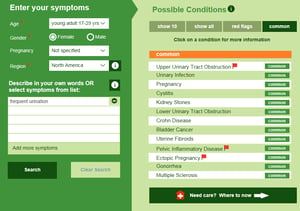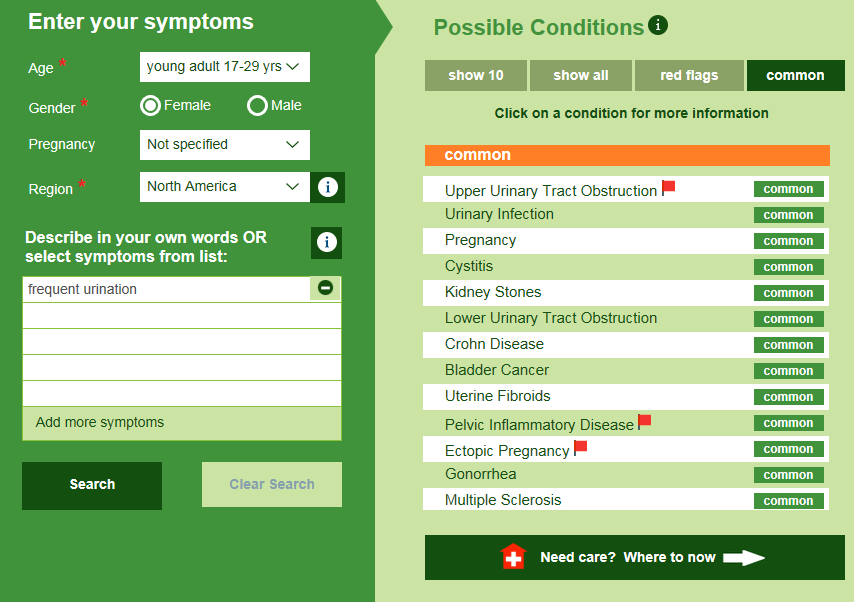- Privacy Policy
- Terms & Conditions
- Contact us
- ©Isabel Healthcare 2025
Symptom information - frequent urination
 Frequent urination (urinary frequency) is the need to pass urine many times during the day, or during the night where the term nocturia is used. Most people urinate 6 or 7 times in 24 hours. Both urinary frequency and nocturia result in more frequent urination, and this can either be more frequent but with less volume of urine, or more frequent with the same volume of urine as usual. Urinary frequency is therefore defined as needing to urinate more than 8 times in a period of 24 hours whilst drinking about 2 litres of fluid. Urinary frequency may be accompanied by the constant or frequent sensation of feeling the need to pass urine urgently. This symptom results from lower genitourinary tract disorders and bladder inflammation, which can cause the sensation of needing to urinate. This sensation doesn’t disappear when the bladder is emptied and patients experiencing urinary frequency continue trying to void but only pass small amounts of urine. Frequent urination can affect your sleep, work and generally how you feel.
Frequent urination (urinary frequency) is the need to pass urine many times during the day, or during the night where the term nocturia is used. Most people urinate 6 or 7 times in 24 hours. Both urinary frequency and nocturia result in more frequent urination, and this can either be more frequent but with less volume of urine, or more frequent with the same volume of urine as usual. Urinary frequency is therefore defined as needing to urinate more than 8 times in a period of 24 hours whilst drinking about 2 litres of fluid. Urinary frequency may be accompanied by the constant or frequent sensation of feeling the need to pass urine urgently. This symptom results from lower genitourinary tract disorders and bladder inflammation, which can cause the sensation of needing to urinate. This sensation doesn’t disappear when the bladder is emptied and patients experiencing urinary frequency continue trying to void but only pass small amounts of urine. Frequent urination can affect your sleep, work and generally how you feel.
Symptoms of frequent urination
Frequent urination may be caused by diseases or infections affecting the urinary tract which consists of the kidneys, the ureters, which are the tubes that connect the kidneys to the bladder, the bladder itself, and the urethra, which is the duct through which urine flows from the bladder out of the body.
Depending on what is causing your frequent urination you may experience other urinary symptoms including:
- urination pain or discomfort
- strong urge to urinate
- difficulty urinating
- loss of bladder control
- unusual urine color
The Isabel Symptom Checker can help you make sense of the symptoms you are experiencing and any other related symptoms:

Isabel Symptom Checker – frequent urination
Causes of frequent urination
Urinary tract infection (UTI)
This is an infection in any part of the urinary system and most UTI’s originate in the lower urinary tract of the bladder and the urethra. Symptoms include urinary frequency, urinary urgency, cloudy urine, pink urine and strong-smelling urine. Antibiotics are normally needed to cure a UTI and to prevent any complications such as pyelonephritis, an acute infection of the kidneys
Pregnancy
Frequent urination is a common early pregnancy symptom and can occur as early as two to three weeks into the pregnancy. This is due to the embryo implanting in the uterus, after which the body produces the pregnancy hormone HCG (human chorionic gonadotropin) and progesterone, which in turn triggers more frequent urination. As the hormone levels stabilize towards the second trimester then the need to urinate decreases. In the third trimester the baby’s size presses more on the bladder and leads to an increase in the need to urinate especially at night. Other symptoms indicating pregnancy may include nausea, fatigue and tender swollen breasts.
Cystitis
This is inflammation of the bladder. The cause of the inflammation can range from a bacterial infection, to side effects of medication, radiation therapy or irritants from spermicidal jellies or long-term catheter use. Other symptoms to look for include a burning sensation when urinating, passing small amounts of urine, blood in the urine (hematuria) or passing cloudy or strong-smelling urine.
Bladder stones
These are hard masses of mineral in the bladder. Bladder stones develop when the minerals in concentrated urine crystallize. Incomplete emptying of the bladder often contributes to bladder stones. Urinary frequency is often accompanied by lower abdominal pain, burning sensation when urinating or difficulty urinating. Men may also experience pain in their penis or testicles.
Urinary tract obstruction
If urine becomes obstructed and is prevented from flowing then symptoms can develop of frequent urination, side pain and decreased or increased urine flow. An obstruction can develop slowly over hours, days, weeks or even months so it should always be considered by your doctor with the symptom of frequent urination.
Seeing a doctor
You should see a doctor if you have urinary frequency which is disrupting your normal well-being and if you have any of these other signs and symptoms:
- blood in your urine or discolored urine color from what is your normal color
- painful urination
- side pain, lower abdominal pain or groin pain
- difficulty emptying your bladder or urination problems
- loss of control of your bladder – incontinence
- fever
Provide your doctor with as much information as you can, and take your Isabel Symptom Checker results with you to help rule out conditions together. It may help you to think about the answer to these questions, which you may be asked:
- When did the urination frequency start?
- How much do you normally drink fluid wise, how many times would you normally pass urine in 24 hours, and what volume of urine do you normally pass?
- How much fluid are you currently drinking, how many times have you passed urine in the last 24 hours, and how much volume are you passing each time?
- Do you have any other symptoms such as discoloured urine or pain?
- Do you have any other symptoms?
- What medicines do you take?
- Do you drink alcohol or smoke? How much?
Your doctor will also perform a thorough physical examination as well as take a full medical history. They may also take a urine sample to conduct a urinalysis, to check for bacteria and white blood cells which could indicate infection. If warranted, once the examination and initial tests have been conducted, the doctor may carry out a cystoscopy to look inside your bladder, or conduct an ultrasound.
Paying attention to changes in your urination pattern and seeking early medical attention will mean diagnosis is prompt and earlier treatment initiated. Enter your symptoms into the Isabel Symptom Checker now and visit your doctor with the results:

Mandy Tomlinson
Mandy has worked for Isabel Healthcare since 2000. Prior to this, she was a Senior Staff Nurse on the Pediatric Infectious disease ward and high dependency unit at one of London's top hospitals, St Mary’s in Paddington which is part of Imperial College Healthcare NHS Trust. Her experience in the healthcare industry for the past 33 years in both the UK and USA means she's a vital resource for our organization. Mandy currently lives and works in Scottsdale, Arizona.
Subscribe Here!
Recent Posts
Isabel DDx Companion with ChatGPT Integration - to help you diagnose even faster
At Isabel Healthcare, we’ve always been driven by one goal: to make clinical reasoning faster,..Virtual Triage: Do more questions lead to better patient outcomes?
One of the common misconceptions related to virtual triage / symptom checker tools is that the more..List Of Categories
- Differential Diagnosis Decision Support
- Differential diagnosis
- Symptom Checker
- Symptoms
- Medical Error
- Patient Disease Information
- Disease
- Clinical Decision Support
- Diagnostic Decision Support
- Isabel 1 Minute Read
- Diagnosis Error
- Diagnosis Skills Cases
- Healthcare Informatics
- Clinical Reasoning
- Evidence-based Medicine
- Medical Education
- Patient Engagement
- Symptom Triage
- Nurse Practitioner Education
- Nursing Decision Support
- Partnership
- Public Health
- COVID-19
- EHR
- Patient Empowerment
- Patient Safety
- rare disease

Start your FREE Trial today
Try the Isabel Pro DDx generator for 30-days - no payment card details required.




